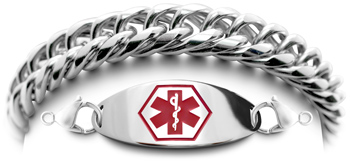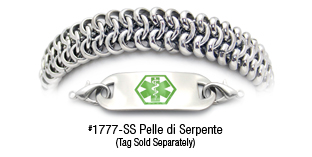Because 1 in 8 women will eventually face breast cancer, a stylish medical bracelet may be an essential part of your wardrobe.

Why breast cancer and lymphedema bracelets are critical in emergencies
Prevent serious injury from needle punctures and blood pressure cuffs in affected arms or legs—doctors warn!
Your ID tag may read:
L-ARM: NO BP/IV
NO NEEDLES/LABS
LYMPHEDEMA
ICE: 888-888-8888
See: ID Abbreviations
Fastest way to warn about lymphedema is a medical bracelet. Paramedics always look first to your wrist for any medical info. See:
Beginners, Lymphedema Help
If you're unable to speak, it's vital that critical medical information is on your wrist. First responders, only have seconds to decide what needs to be done.
When going through breast cancer treatment, most people are prone to serious infections. So you need to convey “ON CHEMO” to avoid serious drug interactions, and also say “ANEMIC” due to the fatiguing side effects of treatment.
Breast Cancer Basics
Women have a 12% chance over the course of a lifetime, of developing breast cancer without taking into account different factors that raise or lower a woman’s risk.
Breast cancer occurs when cells go through abnormal changes or mutations and invade the breast tissue.
This malignant tumor can spread throughout the body if not caught early.
There are 3 main cancers:
1. Ductal carcinoma: Is in the lining of the milk duct tubes that carry breast milk from the milk glands to the nipple.
2. Lobular carcinoma: occurs in the milk glands of the breast.
3. Invasive breast cancer: Spreads from where it began in the breast ducts or lobules to surrounding normal tissue
Cancer/Lymphedema Bracelet prevents injury when every second counts
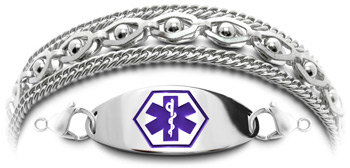
Paramedics want it all. And they want it instantly. Only a medical bracelet is this fast because it's always firmly on your wrist.
Warn doctors and nurses not to take blood pressure, inject medication or draw blood to avoid serious injury to arms and limbs affected by lymphedema.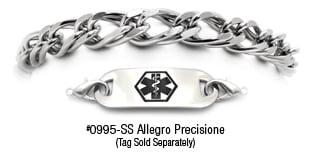
Survivng breast cancer
Being a cancer survivor is not just getting the right treatment early on—it's also a matter of having a strong will and making a personal commitment to important changes in lifestyle, nutrition and fitness. It's also an awareness of the many ways to improve your mental well being—a critical factor. So join the millions of survivors at NBCF for even more help.
Whose at risk?
Mainly women. However, somewhere around 2,000 men develop breast cancer each year in America while approximately 60,000 women will be diagnosed. Genetics is a factor in developing breast cancer. Those with a first-degree relative who has been diagnosed (mother, sister, daughter) are twice as likely to develop the disease themselves often due to an inherited mutation.
Age is a big factor for women; every two of three invasive cancers found in women occur in those over the age of 55
85% have no family history of breast cancer leaving most women vulnerable. These occur due to genetic mutations that happen as a result of the aging process and life in general, rather than inherited mutations.
Avoiding injury to your arm affected by Lymphedema
With the many side-effects of post breast cancer, this is one you can avoid.
Medical ID bracelet is key to prevent injury from blood draws or pressure cuffs on an affected arm.
Simple warning on a ID tag tells EMT's and doctors what to do or not to do.
For more information, see Lymphedema Help.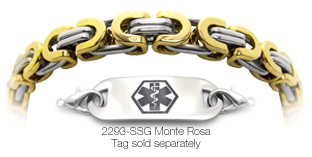
Lymphedema defined:
Build-up of lymph fluid can cause swelling with tissues under the skin.
Removing lymph nodes under arms is to find and remove spreading cancer cells.
Circulation cutoff can occur when these lymph nodes are removed.
Loss of nodes prevents drainage of fluids from arm to the rest of the body.
Body compensates with new, but inefficient flow patterns of lymph and waste.
Swelling occurs when fluids don't drain in the area where the node was removed.
Radiation and surgery can put you at even more at risk for lymphedema.
Lymphedema in legs due to cancer, injury, surgery
Lymphedema is not just in the arms.
It can occur anywhere on the body where lymph nodes are removed because of cancer, injury or surgery.
Lymphedema in men. Anytime lymph nodes are removed close to the legs, lymphedema can occur. Cancer of the prostate, penis, testicles, bladder and anywhere in the pelvis can cause lymphedema of the legs.
Lymphedema in women. Whenever cancer is treated in the pelvic areas including in the uterus, ovaries, vulva, cervix and bladder—this can lead to removal of critical lymph nodes and to lymphedema of the legs.

